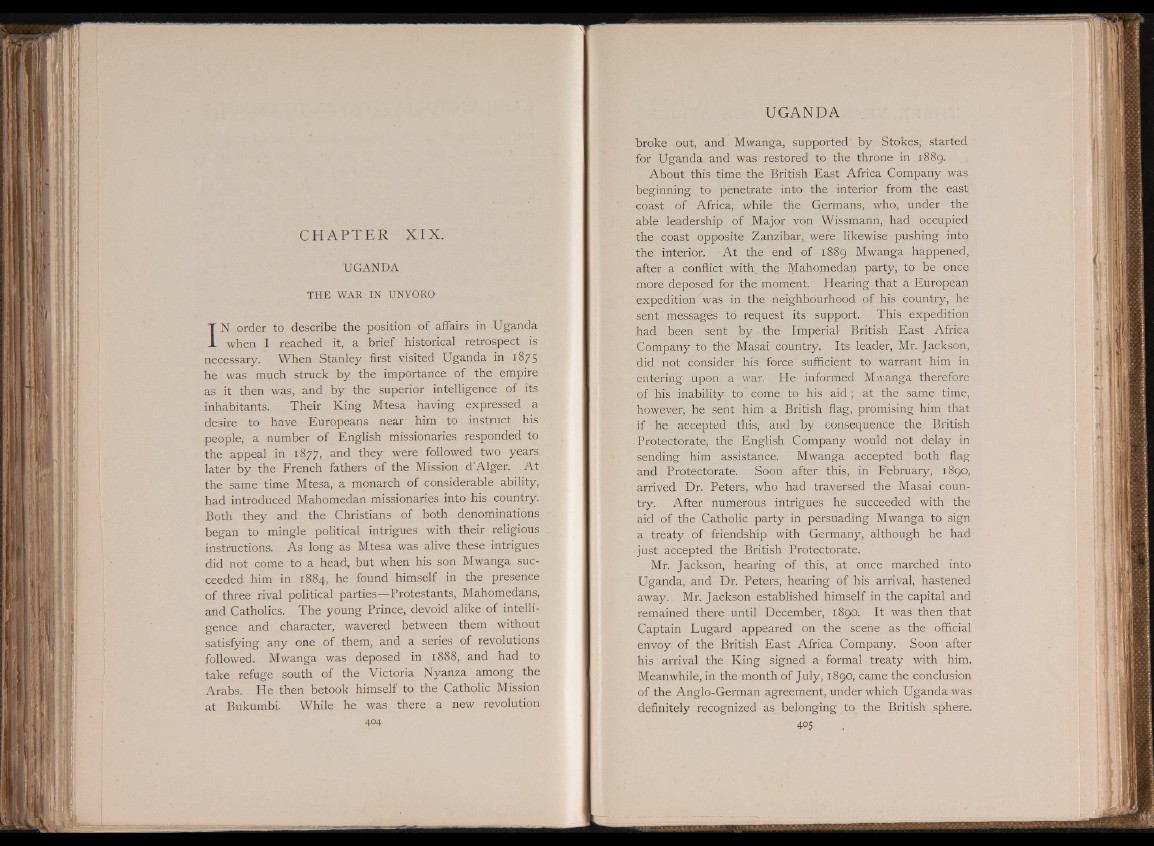
C H A P T E R X I X .
UGANDA
T H E WAR IN UNYORO
IN order to describe the position of affairs in Uganda
when I reached it, a brief historical retrospect is
necessary. When Stanley first visited Uganda in 1875
he was much struck by the importance of the empire
as it then was, and by the superior intelligence of its
inhabitants. Their King Mtesa having expressed a
desire to have Europeans near him to instruct his
people, a number of English missionaries responded to
the appeal in 1877, and they were followed two years
later by the French fathers of the Mission d’Alger. At
the same time Mtesa, a monarch of considerable ability,
had introduced Mahomedan missionaries into his country.
Both they and the Christians of both denominations
began to mingle political intrigues with their religious
instructions. As long as Mtesa was alive these intrigues
did not come to a head, but when his son Mwanga succeeded
him in 1884, he found himself in the presence
of three rival political parties—Protestants, Mahomedans,
and Catholics. The young Prince, devoid alike of intelligence
and character, wavered between them without
satisfying any one of them, and a series of revolutions
followed. Mwanga was deposed in 1888, and had to
take refuge south of the Victoria Nyanza among the
Arabs. He then betook himself to the Catholic Mission
at Bukumbi. While he was there a new revolution
404
broke out, and Mwanga, supported by Stokes, started,
for Uganda and was restored to the throne in 1889.
About this time the British East Africa Company was
beginning to penetrate into the interior from the east
coast of Africa, while the Germans, who, under the
able leadership of Major von Wissmann, had occupied
the coast opposite Zanzibar,, were likewise pushing into
the interior. At the end of 1889 Mwanga happened,
after a conflict with the Mahomedan party, to be once
more deposed for the moment. Hearing that a European
expedition was in the neighbourhood of his country, he
sent messages to request its support. This expedition
had been sent by the Imperial British East Africa
Company to the Masai country. Its leader, Mr. Jackson,
did not consider his force sufficient to warrant him in
entering upon a war. He informed Mwanga therefore
of his inability to come to his aid; at the same time,
however, he sent him a British flag, promising him that
if he accepted this, and by consequence the British
Protectorate, the English Company would not delay in
sending him assistance. Mwanga accepted both flag
and Protectorate. Soon after this, in February, 1890,
arrived Dr. Peters, who had traversed the Masai country.
After numerous intrigues he succeeded with the
aid of the Catholic party in persuading Mwanga to sign
a treaty of friendship with Germany, although he had
just accepted the British Protectorate.
Mr. Jackson, hearing of this, at once marched into
Uganda, and Dr. Peters, hearing of his arrival, hastened
away. Mr. Jackson established himself in the capital and
remained there until December, 1890. It was then that
Captain Lugard appeared on the scene as the official
envoy of the British East Africa Company. Soon after
his arrival the King signed a formal treaty with him.
Meanwhile, in the month of July, 1890, came the conclusion
of the Anglo-German agreement, under which Uganda was
definitely recognized a s . belonging to the British sphere.
405